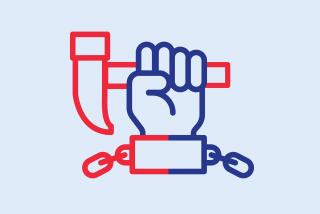Measure on Suicide Fought by Churches : Election: Catholic sources give most of the $1 million that finances the campaign against Oregon proposal. It would allow doctors to prescribe lethal drugs to terminally ill.
- Share via
PORTLAND, Ore. — In a rare confluence of opinion, faith groups from Buddhists to Baptists have united behind the Roman Catholic Church to fight an assisted suicide measure on Oregon’s general election ballot.
Supporters of the measure have portrayed the opposition as Catholics who are out of touch with the rest of society.
The Catholic Church has raised three-quarters of the $1 million being used against Measure 16, much of it from collections during Sunday services.
But Jewish, Muslim and Buddhist leaders, along with 16 other Christian denominations, now have come out against the measure as well.
Measure 16 would make Oregon the first state to legalize assisted suicide. If a doctor believes that a patient has less than six months to live, and a second doctor agrees, the patient may ask for a lethal prescription. The request must be made twice, then once again in writing, after the doctors have made sure every alternative has been rejected. The patient must take the final step of ingesting the lethal prescription, which could consist of barbiturates.
Religious leaders say that decision is one that should not be made by anyone but God.
“The mood of most evangelical Christians that believe the Bible is God’s word would be concerned with any measure that would prematurely take anyone’s life,” said the Rev. Bill Wilson, senior pastor at Portland Christian Center, an Assembly of God church.
“You die when your time is up,” said Fu-gen Schmelzer, a member of the Portland Temple of Chinese Buddhists. “There’s no running away from the situation.”
Geoff Sugerman, director of the Oregon Right to Die campaign, said it still is the Catholics who are raising the money to fight the measure. And he claimed that many members of the churches, including Catholics, are divided on the issue.
“Clearly in terms of our opposition, it’s coming from the hierarchy of the church. That’s why you’re seeing archdioceses and bishops around the country pumping in hundreds and hundreds of dollars,” he said.
There are mixed feelings among members of the United Methodist Church, said the Rev. Ross Miller. “We have some people for it, some against it,” he said. “Quite a few people like the idea. It’s an area where you take a great deal of caution, though.”
The United Church of Christ and United Unitarian Church support the measure, saying it is up to the individual to make such decisions.
Joining the churches that oppose the measure are health organizations, such as the American Medical Assn. and the National Hospice Organization. They point to the scores of patients who were told they would die within months, then lived for many years.
Right-to-die advocates say the issue boils down to personal choice. “I think people of good conscience, of all faiths, agree that individuals with terminal illnesses deserve control and choice over their lives,” said Barbara Coombs Lee, a chief petitioner for Measure 16.
In the long run, however, what organized religion thinks about the measure may have little effect in a state where 17% of the population has no religious affiliation.
Polls have indicated widespread support for the initiative, but that was the case in Washington and California before voters there narrowly defeated similar measures. Those measures also were more strongly worded, allowing physicians to administer the fatal drugs.
More to Read
Sign up for Essential California
The most important California stories and recommendations in your inbox every morning.
You may occasionally receive promotional content from the Los Angeles Times.













